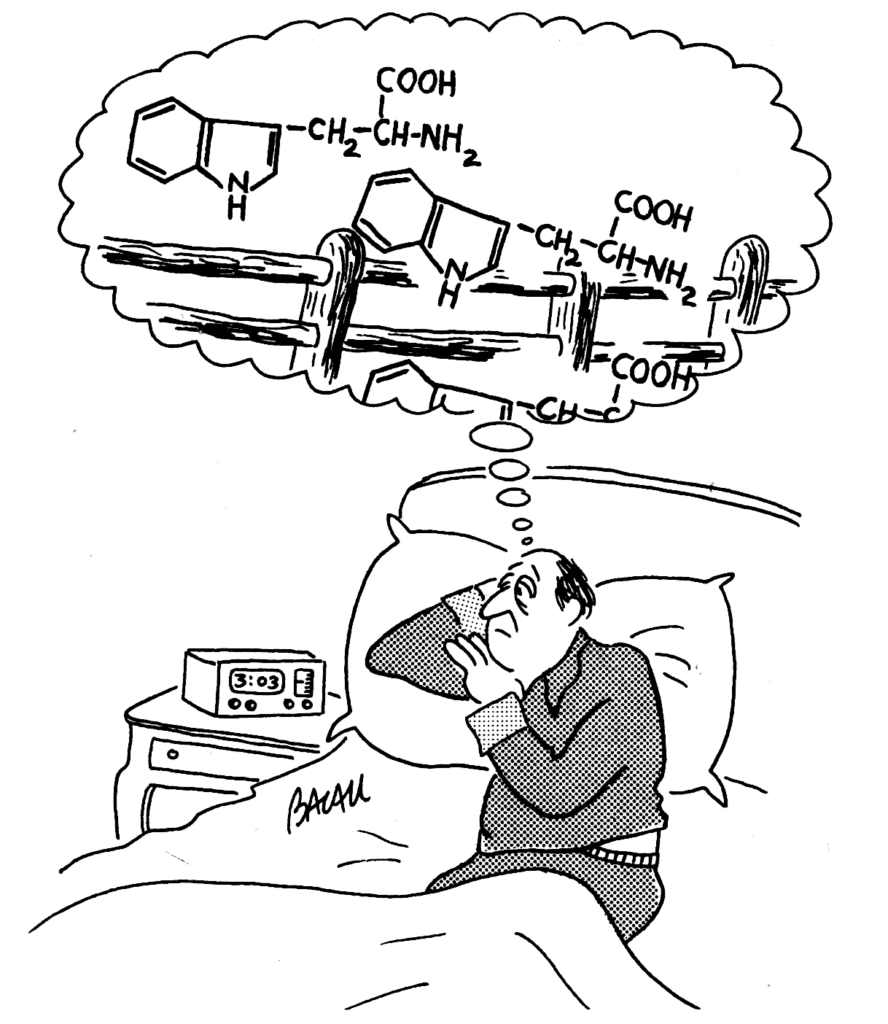Science consists in grouping facts so that general laws or
conclusions may be drawn from them.
—Charles Darwin
Sleep is a complex state controlled by a number of different brain chemicals. In aged individuals, these brain chemicals may not be made in as great a quantity as in youth. Brain cells may become less sensitive to the chemicals. As a result, sleep difficulties become more common with age. But with our growing understanding of the various control systems underlying sleep, we may be able to do a lot to improve our ability to sleep soundly, using nutrients and certain prescription drugs. For nearly everyone, young or old, proper sleep patterns are essential to good health.
One of the most common disorders in old age is the development of faulty sleep patterns. Uncontrolled flights of thought may keep an older individual awake for hours after going to bed. Or a person may fall asleep easily but wake again in the night and have difficulty getting back to sleep.
The consequences of disrupted sleep patterns like these are more serious than just weariness and irritability.
CAUTION: Keep in mind that sleeplessness can sometimes be an indication of an underlying medical disorder that may require your physician’s intervention. Before you try any of our suggestions, check with your doctor to make sure that these are not the symptoms of a serious illness. Do not at-
tempt self-diagnosis.
There are patterns of chemical changes that occur in the brain and body during sleep. One especially important biochemical rhythm is the release of growth hormone (GH) shortly after sleep begins. Adequate GH is necessary for proper function of the thymus and its “troops,” the T-cell immune
system that defends the body against bacteria, atherosclerotic plaques, viruses and cancer, and autoimmune self-attacks such as in rheumatoid arthritis. If sleep is delayed or interrupted, GH release can be eliminated, reduced, or aborted. And without a healthy T-cell system, aged persons are susceptible to disease and cancer. (In fact, the old wives’ tale that
kids’ growth can be stunted by not sleeping well is true. Children have to have adequate levels of growth hormone in order to grow properly.) The reduction in nighttime GH in the aged cannot be entirely accounted for by age changes in sleep patterns. The lower levels of dopaminergic signals in the aged brain play an important part too.
The cholinergic nervous system in the brain is what controls body movement and sensory sensitivity during sleep. Too much or too little can cause excessive motor activity, such as sleepwalking or endless tossing and turning. In aged persons, there is a sharp decline in activity of the cholinergic system which leads to faulty sleep, particularly involving
restlessness and frequent awakening not caused by urinary urgency.
Another sleep disturbance often encountered in older people is increased need to urinate during the night, leading to frequent awakenings. This may be due to insufficient production and/or release of the pituitary hormone vasopressin, which controls urine volume. Vasopressin (Diapid® nasal
spray) can help, but it has a short life in the body and may wear off before morning. In men, an enlarged prostate gland is the most likely cause of this nighttime urinary urgency. Bromocriptine (Parlodel®, Sandoz), 1 1/4 to 2 1/2 milligrams before bedtime, or GABA (gamma aminobutyric acid), an amino acid neurotransmitter, in doses of 20 to 40 milligrams per day
(in tablets held under the tongue) may help decrease this problem by suppressing the release of the hormone prolactin by the pituitary gland. Excess prolactin can be a contributing cause of prostate enlargement. Any possible case of prostate enlargement should be promptly checked with a urologist, since prostate cancer becomes much more common with advancing age. There is growing evidence that prolactin is an

immunosuppressive hormone. If this is so, bromocriptine will have a double-barreled effect in prostate enlargement by both reducing the excessive tissue growth stimulation and by helping to restore immune competency so that your T-cells can more readily destroy any abnormal or precancerous cells present. A third possible cause of urinary urgency is kidney damage, which is all too common in advancing age. The most
common cause of kidney damage is high blood pressure, though there are many other possibilities. Kidneys do not have the extensive regenerative ability of the liver or spleen; hence any hint of kidney problems calls for a prompt visit to your physician so that the damage can be stopped before you become a dialysis patient dependent on an artificial kidney.
Are you interested in life extension products?
mod4all ships all major brands of Modafinil from the UK
All products shipped from the UK by tracked post. We guarantee delivery.
We guarantee delivery, free reshipping.
Any questions at all about payments, shipping, etc. Anything at all, just email us.

Comments (0)